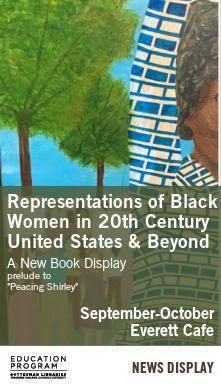New Book Display: Representations of Black Women in 20th Century United States & Beyond, through October
Everett Cafe
The experience of the Black woman in the United States during the twentieth century is one that is highly complex and variable. Towards the earlier half of the twentieth century, less than fifty years following the abolition of chattel slavery, Black women became the first to record Blues music. This music, which was influenced by the Negro spirituals sung on slave plantations, often contained accounts of the everyday problems faced by working class people at the time whose everyday problems included issues with racism, dealing with poverty, losing love, migration, and keeping a family. Despite the level of fame and notoriety Blues women often gained, their music remained relatable to other working class Black women. Titles such as Blues Legacies and Black Feminism paint an image of this time in history, while novels such as The Bluest Eye and The Color Purple allow readers to “travel” to this time period through the subjecthood of their working-class protagonists.
Towards the mid-twentieth century, most Black women [and people] in the United States held interest in the Civil Rights Movement. Some Black women entertainers, such as Billie Holiday, Mariam Makeba and Nina Simone, played an important role in disseminating political messages to mass audiences through song and performance, while working class Black women held foundational roles as local community organizers and activists. An important aspect of this period is that a lot of intra-communal social scrutiny was placed on Black women due to respectability politics. More than ever, with the entire nation paying attention to Civil Rights, Black women were expected to embody perfect moral piety, so as to “disprove” existing stereotypes. But, not all Black women would agree to this social code, and many-faced social consequences for it. Titles such as In Search of Billie Holiday, How It Feels to Be Free, Unbought and Unbossed, and Black Women & Politics in NYC paint a vivid historical image of this political moment.
It was this political climate which bred the careers of politicians such as Shirley Chisholm, who became the first Black woman elected to Congress in 1968. The lasting impact of Shirley Chisholm inspired the curation of literary and other works which also do the important work of providing representation—particularly, representation of Black women’s experiences in the United States.
Representations of Black Women in 20th Century United States and Beyond is curated by Monben Mayon, 2022 awardee of the Gottesman Libraries’ commissioned artwork, Peacing Shirley, an installation which pieces together different aspects of congresswoman Shirley Chisholm’s multifaceted and wide-reaching legacy. The book display is designed by Trisha Barton, Gottesman’s Lead Designer.
Where: Everett Cafe

At the Everett News Cafe, you'll find a new book collection every few weeks that relates to current events, education, or learning environments.

